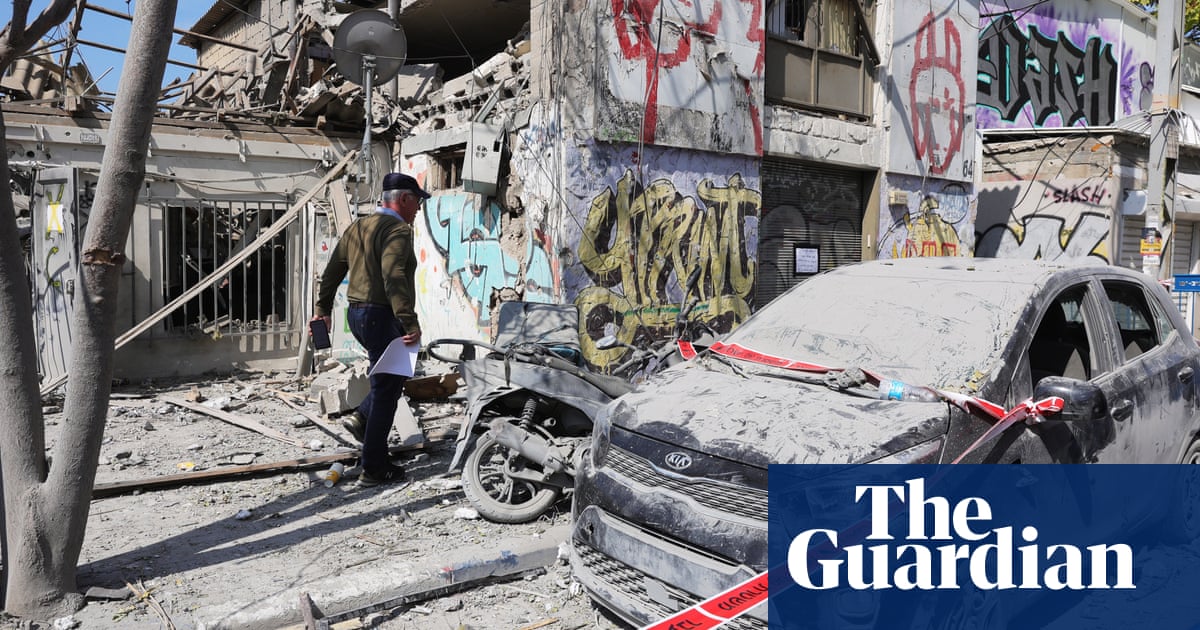
om Stoppard’s Leopoldstadt was just beginning its eighth sold-out week at Wyndham’s theatre in London’s West End when the order came through that it was shutting down. Greeted as a late-period masterpiece – and possibly the final play – of a leading playwright who had waited until his 80s to investigate his Jewish background, it was a huge production to match the scale of the history it charted, following a prosperous Viennese family from 1899 to 1955, with opening and closing tableaux that revealed just how annihilating the intervening years had been.
Though it was not intended to offer a topical reflection on the antisemitism that has been tearing the left apart in the UK over the past few years, its debates about the limits of assimilation hit a nerve, and audiences poured in. “I thought this was the tail end of interest in the Holocaust, but as a matter of fact it had become a sort of hotspot. I didn’t write about more recent events, but it was part of the consciousness that the audience brought to the play,” reflects Stoppard.
This consciousness that, for all that it was set in the past, the play was telling an important and topical story, was passionately shared by the 43-strong cast, more than two-thirds of whom were themselves Jewish, who were determined to carry on for as long as they could as the closure of public spaces swept across the globe. Though the West End was emptying, Leopoldstadt’s audiences kept turning up – increasing numbers of them in face masks. When the decision to shut down was finally taken, the company went off to a local pub to await further instructions, recalls producer Sonia Friedman, “and all we could say to them was: ‘You have to go home’”.
If you want to understand just how devastating the Covid-19 crisis has been to the world of entertainment, you need look no further than the week that Friedman will never forget. On the afternoon of Wednesday 11 March, her production of Harry Potter and the Cursed Child was midway through a performance at San Francisco’s Curran theatre when the city’s mayor announced a ban on all events involving more than 1,000 people. “For better or worse we made the decision to keep going but shut down in the evening after part two. There had been a state of emergency in California from early March and we’d been watching sales haemorrhage,” says the producer, whose 11 productions running around the world at the time included five of the hit JK Rowling play – in Germany, Australia, the US and London.
The following afternoon New York closed all its Broadway theatres, taking down a further three of Friedman’s shows. On Friday, the German production of Harry Potter was shut down on the final day of previews in Hamburg. On Sunday, Melbourne theatres closed, taking the Australian production with it, and on Monday 16 March – “by this point in acute crisis mode” – Friedman took the preemptive step of heeding Boris Johnson’s “advice” that all UK entertainment outlets should close, and shut down her five remaining productions.
A couple of cast members had already gone into self-isolation after developing fevers. “I was in my London office, wearing a mask, with some of my staff, and we were all in a state of shock,” Friedman recalls. “I announced that, even though we hadn’t been given a mandate [the full lockdown only happened on 23 March], I was closing everything until further notice.” A press release was scrambled and a squad of associate producers sent out to break the news to each theatre, while Friedman sat in her London HQ fielding panic calls. Besides the 11 shows that were already open, she had seven more in production.
Nearly three months on, the shock has transformed into the passionate determination that has made Friedman one of the world’s most successful theatre producers. She abandoned her London home before official lockdown to stay with her writer partner, Joe Murphy, and their two dogs in a Hampshire cottage rented to them by Tom Stoppard’s wife, Sabrina Guinness. For the first eight or nine weeks, given the number of shows she had suspended and “the absolute tumult of chaos and uncertainty” it had created in so many time zones, Friedman only managed three or four hours sleep a night. “I’ve been trying to do what I can to save my industry and my people, talking constantly with my staff, theatre owners, producers and investors, but no one has any answers.”
Only now has a working group been set up in the UK between the Department for Digital, Culture, Media and Sport (DCMS) and UK theatre’s two main umbrella bodies to try to plot a practical course for survival. If none is found, the industry has warned, 70% of UK venues will have run out of cash by the end of the year. The first casualties have already been announced, with Southampton’s Nuffield anf Leicester’s Haymarket theatres going into administration last month. “For the first weeks we kept quiet, which was quite right, because it was all about health and care workers, then we had to wait for them to sort out sport. Theatre always comes last,” sighs Friedman, “but more people go to at least one show every year than go to all league football matches put together.”
The figures are startling: the UK has some 1,300 theatres around the country employing some 290,000 workers, from actors to administrators, stage technicians to front-of-house staff. A paper sent to the DCMS last month by the Society of London Theatre and UK Theatre points out that in 2018, their members sold tickets worth £1.28bn. The theatre’s value to the London economy, where nearly half of all UK performances take place and tourists make up a quarter of audiences, is estimated to be £5bn a year. And Friedman’s portfolio of closed shows is testament to the export value of this dynamic British industry.
But the crisis facing commercial producers is particularly acute, because they have no state subsidy, and a global pandemic did not fall within the terms of their insurance policies. In a telling coincidence, Leopoldstadt was being staged in a theatre, Wyndham’s, that opened in 1899, the same year as Stoppard’s dynastic history begins. In London, as in the Vienna of the play, the late 19th century was a period of optimism that produced many of the ornate and costly playhouses that are now lying dormant. As Friedman points out, it’s costing more than £30,000 a week to keep each West End theatre closed. In the best of times they need to average at least 65% ticket sales at full price just to break even, but this doesn’t take into account restart costs, which are likely to raise that to at least 75%, making physical distancing of audiences impossible without game-changing state support. With current Arts Council emergency funding due to cease in September, theatre lobbyists say: “The impact of this pandemic represents the greatest existential threat to the British theatre industry since the closures of playhouses which ended the golden age of Jacobean theatre in 1640.”
For Friedman, Leopoldstadt was an act of faith and love, and a belief in the ability of the commercial theatre to go beyond the usual crowd-pleasers. “It was hugely ambitious and one of the biggest plays I’ve ever produced, with a larger cast than Harry Potter or Jez Butterworth’s The Ferryman.” Though some reviewers complained that the sheer volume of information was overwhelming, she adds that “it’s safe to say that it’s right up there as one of the biggest hits I’ve ever produced: it was one of the greatest honours of my career, and profoundly moving for me and the people who saw it.” Offered the choice between refunds and seats when – and if – the show reopens, 45% of those who had booked have opted to stick with it.
Theatre is such a people-centred industry that its resumption poses particular problems, and return plans will have to be carefully tailored to the profile of each show. The first of Friedman’s shows to reopen will probably be Harry Potter in Australia, where measures to contain the pandemic have been considerably more successful than in Europe and the US. “We’re aiming for September, and I think it’ll be a test case for the world,” says the producer. Since audiences for Leopoldstadt are generally older than those for other West End shows such as Harry Potter or The Book of Mormon, it will probably make a later return – but so long as the company still wants to do it, and the audience still wants to see it, return it will, she promises. And from London, all being well, it will go on to New York.
Keeping faith with a vision for a post-Covid world is hard but crucial, Friedman insists. While her days are spent lobbying and problem-solving with the half of her 40-strong core staff who have not been furloughed, the hours between 11pm and 2 or 3am are devoted to “what I call my future: every day I do something positive to imagine there’s something on the other side of this, other than resuming the shows at hand.”
The potential of the crisis as a source of future themes and plotlines is not lost on her. “We exist in a world of stories in our theatre and this story isn’t credible yet we’re living it,” she says. “I keep telling people, ‘this is history, guys’, it’s going to be discussed for centuries. We’re dealing with something so monumentally complex that the biggest brains in the world are only just beginning to come to terms with what needs to be done.”
As a theatre producer it pays to be Teflon-coated. “I’ve always been quite good in a crisis,” she says, “I’m not going to give up until I’m done, and if I’m done the rest of the industry is going to be done too, because until then I’m sure as hell going to be still standing.” Meanwhile the venerable Wyndham’s theatre slumbers on, its grand Viennese apartment set swathed in ghostly plastic sheeting, waiting for the great awakening.












